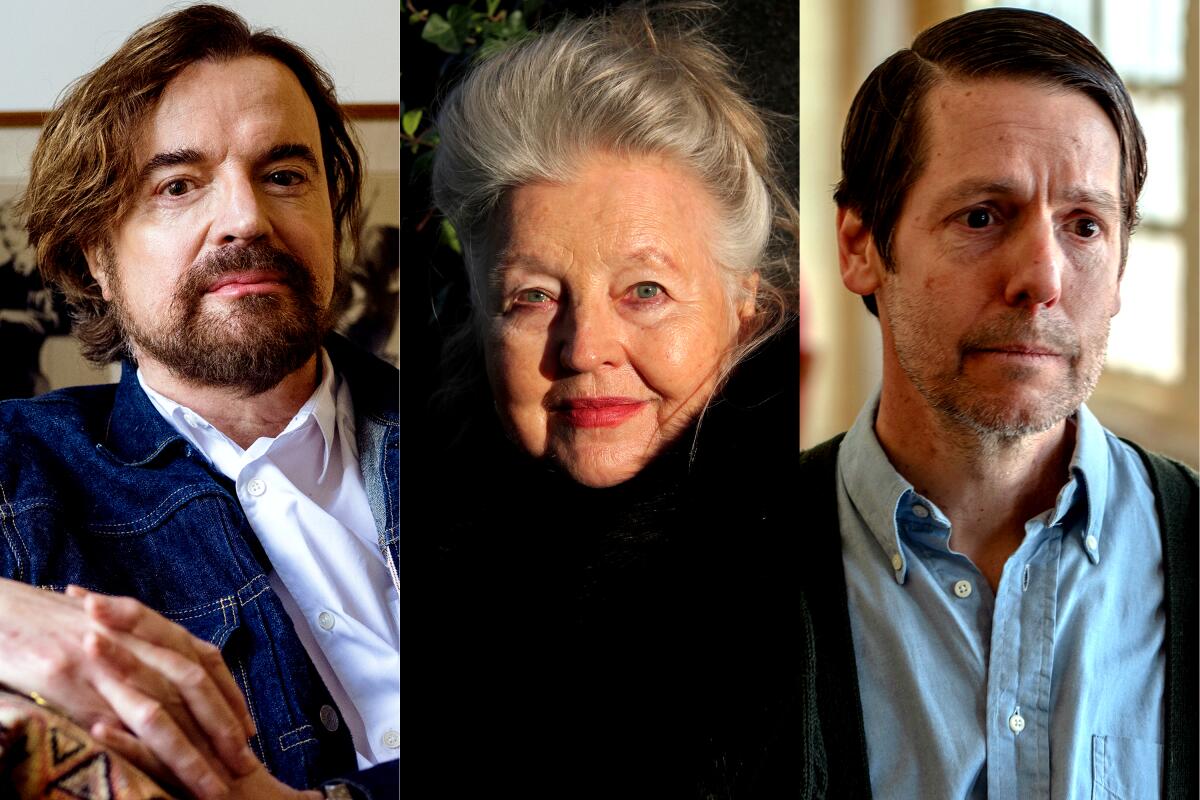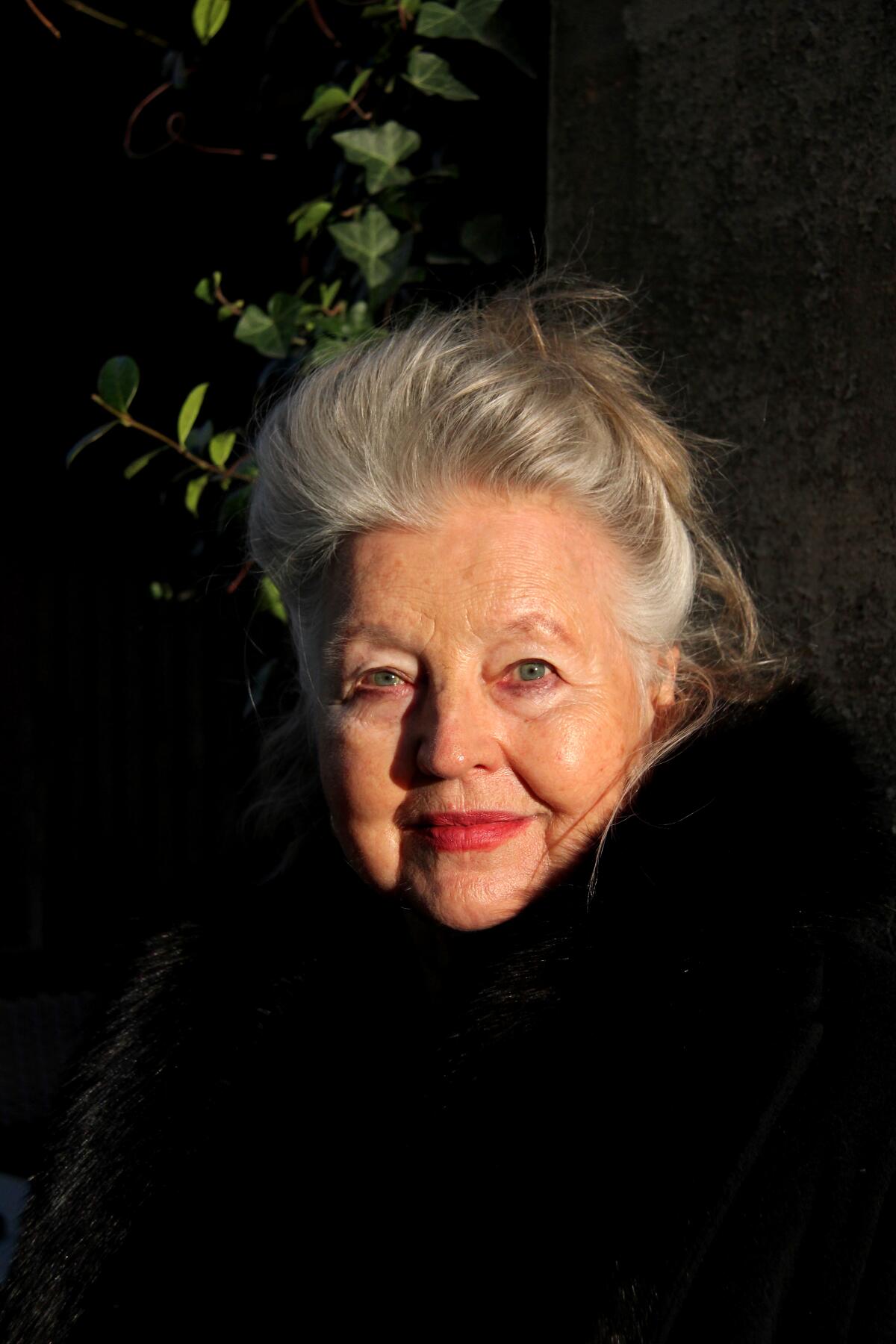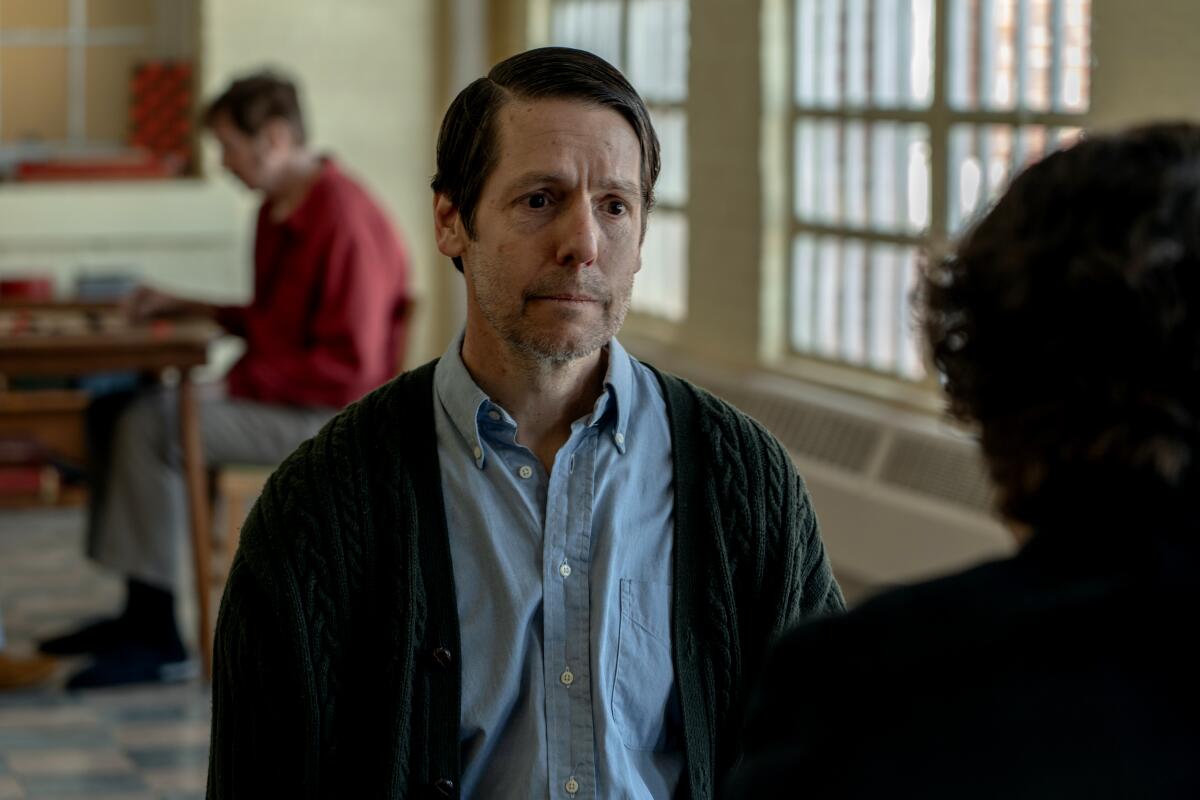Their roles in this season’s buzzy films were small. The impact they had was huge.

- Share via
A great performance leaps off the screen, regardless of its size. We can sense an entire life behind what we see. Here, The Envelope steps away from the big names — and the big roles — of the Oscar nominations to look at some supporting players who helped make those buzzy films stand out.

Hanna Schygulla
as Martha Von Kurtzroc, “Poor Things”
In the Frankensteinian “Poor Things,” Bella Baxter (Emma Stone) sees Martha Von Kurtzroc across a ship’s dining room and is drawn first to her froth of hair, then to her independent nature. Martha is played by German actor Hanna Schygulla, muse to Rainer Werner Fassbinder (“The Marriage of Maria Braun”), so it’s fitting that she plays opposite Stone, muse to director Yorgos Lanthimos.
Schygulla, who lives in Berlin, is not predisposed to emails or texts, so Lanthimos wrote her an actual letter to offer her the role. “He said more or less that each time, even if he saw me in a small part, I was able to give it a certain flavor,” Schygulla says, speaking (via landline) from Berlin. The script enticed her, “because it was setting up a cosmos that was built with past and futuristic elements,” something she hadn’t seen before.
Her scenes mark the film’s turn from a male-dominated story to one more populated by women. “My character is like an early bird of women’s lib, which Bella becomes then too.” She enjoyed working with Stone, calling her “present and open to everything,” and was surprised the star knew her by reputation. “She took a reverence in the beginning which was to me quite amazing; I thought she wouldn’t know me. That was very charming and gave me an outlook on her culture too.”
Lanthimos writes that Schygulla was ideal to play Martha, “a more mature and experienced woman that can open new doors for Bella’s intellectual and social evolution. She brought gravitas and a sense of humor and depth in the very few scenes she appears. We were all full of awe and admiration and feel lucky to have had her with us, even if it was for a short time.”

Stephen Thorne
as Thomas Tully, “The Holdovers”
When “The Holdovers’ ” hidebound professor Paul Hunham (Paul Giamatti) and rebellious student Angus Tully (Dominic Sessa) take a road trip to Boston, Angus is forced to reveal a secret: His dead father, Thomas, is actually alive, locked up in a psychiatric institution, and Angus is desperate to visit him. The moment the heavily medicated Thomas sees his son, his eyes light up, and he says two words that melt anyone watching: “Hello, sweetheart.”
Thomas is played by Stephen Thorne, an actor and longtime member of the acclaimed Trinity Repertory Company in Rhode Island. After he auditioned for the role, a callback brought him face to face with director Alexander Payne. “I’m a huge admirer,” Thorne says, “so I thought, this is worth the price of admission right here, just to walk in and say hello, whatever happens.”
Day player parts are usually challenging; “you’re trying to be a gymnast, to perform this exact thing for this exact moment, with very little knowledge about what has come before or is coming up in the movie,” he says. But Payne had the entire cast read the script together over Zoom, “which was so helpful in crafting what is a very short but significant moment.”
Thorne felt that despite Thomas’ mental state, “the sight of his son would stir something inside of him.” But after the loving greeting, Tully is soon consumed by his paranoia, and Angus is powerless to stop him.
Payne notes, “I was worried about that role, because the portrayal of mental illness has to be taken seriously. I’ve received a lot of compliments about Stephen’s performance, particularly from people experienced with mental illness in their families. One senses the sane version of Thomas trapped inside but weary and defeated from the struggle to escape.”

Paul Rhys
as Duncan, “Saltburn”
As the butler of Saltburn, the country estate in which all manner of gruesome activities take place, Paul Rhys presides with a fabulously grim countenance, ghostly yet all too corporeal. “I loved being Duncan,” Rhys says on a call from London. “There’s something about somebody who’s so corseted and withheld, and speaks so little but thinks so much, that’s very satisfying. It’s like being in a silent movie, Buster Keaton or something, and you are this presence. It makes you more articulate on the inside.” Rhys also played the loquacious Tallyrand in “Napoleon” last year. “Tallyrand said that words were invented to disguise what we feel. And I think that’s true of Duncan.”
Writer-director Emerald Fennell calls Duncan the embodiment of the gothic impressionistic film. When discussing the role with Rhys, “I said, ‘Duncan is the house,’ and he said, ‘Oh, yes.’ And that was it.”
Rhys first came to Fennell by way of her star, Rosamund Pike. “She called him the best actor of his generation.” Fennell soon came to agree, using the words “magical,” “transcendent” and “supernatural” to describe him. “I’m so obsessed with him that I don’t know where to start.”
Rhys believes the magic is all hers. “I’ve played much, much bigger roles, and I don’t want to talk about them so much. I don’t know what it is,” he says. “If I could make films with Emerald for the rest of my life, I’d be very happy, speaking or nonspeaking.” He filled notebooks with Duncan’s biography and even lived in the mansion’s servants’ quarters, at his request. “It was a spooky and wonderful experience. I know people laugh at me for taking things a bit far, but I do think these things communicate somehow in the mystery that is film.”
More to Read
Sign up for The Envelope
Get exclusive awards season news, in-depth interviews and columnist Glenn Whipp’s must-read analysis straight to your inbox.
You may occasionally receive promotional content from the Los Angeles Times.










